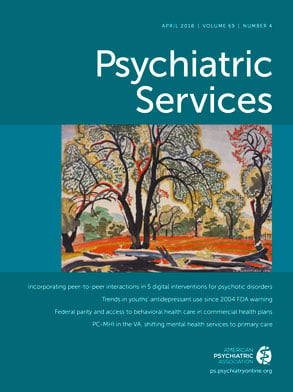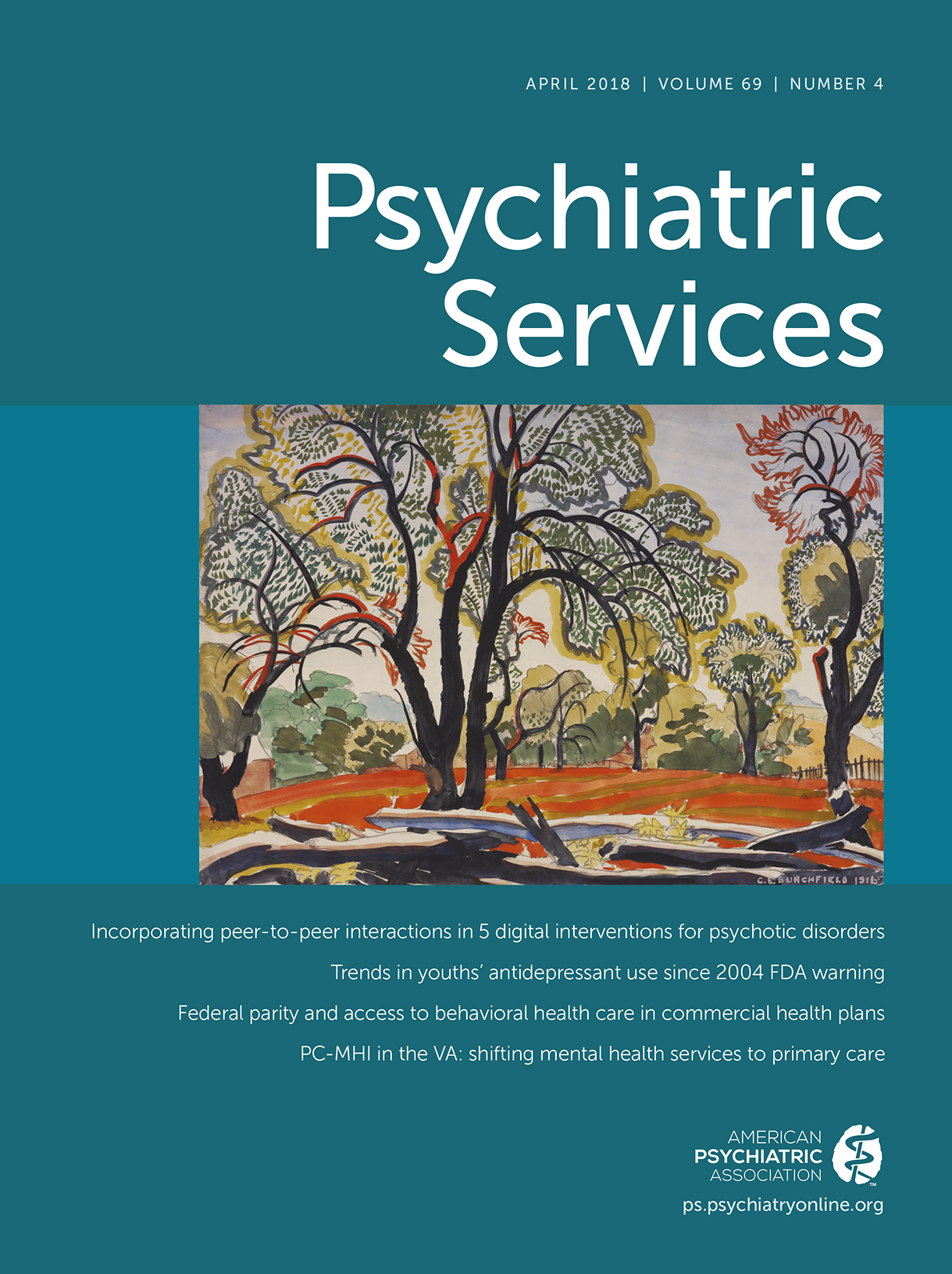People with serious mental illnesses have disproportionately high rates of criminal justice involvement, compared with individuals without serious mental illness. Between 2008 and 2014, 25%−27% of people with serious mental illness reported being arrested in their lifetime, compared with 17%−18% of those without serious mental illness (
1). After release from correctional supervision, people with and without serious mental illness are at elevated risk of poor health outcomes, including poorly controlled behavioral and somatic conditions, drug overdose, and premature mortality (
2,
3).
Engaging people with serious mental illness in evidence-based health care and social services in the community following release from jail or prison is a public health priority. However, such engagement is challenged by multiple factors, including lack of comprehensive reentry planning, limited social support networks, and policies restricting eligibility for public benefits on the basis of criminal justice involvement (
1). Negative attitudes toward this population among health care and social service providers may also hinder engagement in effective services. Providers’ biases and endorsement of stereotypes about the individuals they serve can lead to suboptimal service delivery along several pathways, including by affecting the amount of time providers devote to helping specific individuals, communication style, and willingness to engage in shared decision making (
4–
6). Such attitudes—and associated deficiencies in care—are amenable to intervention (
7). Prior research shows that some health care providers hold negative attitudes toward people with serious mental illness overall (
8,
9), but no previous studies have examined providers’ perceptions of criminal justice–involved individuals with serious mental illness. Our study addressed this gap.
Methods
We surveyed providers working in Maryland psychiatric rehabilitation programs, which are affiliated with outpatient mental health clinics and provide skills training, case management, and social service coordination for persons with serious mental illness. This survey was conducted as part of a larger study of Maryland’s Medicaid health home program, which provides approved psychiatric rehabilitation programs with Medicaid reimbursement for coordinating somatic health care services. Frontline psychiatric rehabilitation program providers, including social workers, case workers, counselors, and other staff who interact with clients, at the 45 health home programs active during the study period (April–December 2016) were eligible to participate in the survey. Executive leaders and other administrative staff not providing direct client services were excluded.
Participants completed a 165-item paper-and-pencil survey assessing attitudes in multiple domains. [The full survey instrument is included in an online supplement to this report.] This study focused on responses to 28 items in three domains: providers’ experiences working with, positive regard for, and perceptions of their own similarity to clients with serious mental illness with and without current criminal justice involvement. At the beginning of the survey, criminal justice involvement was defined as “individuals who have ever been arrested, convicted, or are on parole or probation.” Providers were then asked if they currently work with one or more clients with past or current criminal justice system involvement.
Individual survey items on positive regard and perceptions of similarity are shown in
Table 1. The items regarding providers’ experiences were newly developed for this survey. Providers’ regard for clients was measured with seven items adapted from Jonassaint and colleagues (
10), who showed that compared with providers with high regard for HIV-positive patients, providers with low regard were more likely to receive poor quality-of-care ratings from their patients. Responses to experience and regard items were measured on 5-point Likert scales (1, strongly disagree; 2, disagree; 3, uncertain; 4, agree; and 5, strongly agree). Providers’ perceptions of similarity with their clients was measured with four items adapted from an instrument developed by Street and colleagues (
11), who found that these items predicted patients’ trust in and satisfaction with their provider and intent to adhere to treatment. Responses were measured on a 5-point Likert scale (1, very different; 2, somewhat different; 3, neither different nor similar; 4, similar; and 5, very similar). We conducted exploratory factor analysis to assess whether measures could be averaged to create aggregate scales of regard and similarity.
The regard and similarity items were repeated twice in the survey. First, providers were asked to respond to the questions while they were thinking about their most recent adult client with serious mental illness. Second, providers answered the same questions while thinking about their most recent criminal justice–involved client with serious mental illness. The survey also measured providers’ demographic characteristics, including sex, race, and ethnicity.
We analyzed the data by using descriptive statistics in the overall sample and in the sample stratified by provider race (white or nonwhite) and gender. Five-point Likert scales were collapsed into dichotomous items indicating agreement (strongly agree and agree) versus lack of agreement (uncertain, disagree, and strongly disagree) and similarity (very similar and similar) versus dissimilarity (neutral, different, and very different). Differences in attitudes toward clients with and without criminal justice involvement were assessed by using McNemar’s chi-square test.
Results
The survey was completed by 627 providers at 38 health home program sites. The 38 sites represented 86% of the 45 total health home programs in Maryland during the study period. Two sites refused to participate, and five sites did not respond to requests to participate. Among eligible providers at the 38 participating sites, the response rate was 83%. Most providers who completed the survey were female (N=451, 73%). Fifty-seven percent (N=347) were white, 33% (N=200) were black, 2% (N=13) were Asian, 4% (N=22) were of two or more races, and 4% (N=26) identified as being from another racial group. Four percent of respondents (N=26) identified as being from another racial group. Four percent of respondents (N=26) identified as Hispanic or Latino.
A total of 560 of the 627 providers surveyed (90%) reported currently working with criminal justice–involved clients. Providers reported high levels of comfort (85%) working with this population, and most (79%) believed that serving criminal justice–involved clients is a good use of organization resources (
Table 1). Less than half of providers felt that, compared with other clients, working with this population was more time consuming (39%), challenging (34%), or emotionally exhausting (24%).
Providers had high levels of regard for criminal justice–involved clients with serious mental illness. However, they reported lower regard for this group than for clients without criminal justice involvement on six of seven items: have a great deal of respect for the client (79% versus 95%, p<.001), find the client interesting (84% versus 92%, p<.001), like the client (72% versus 86%, p<.001), the client is a person who makes me feel glad I work in psychiatric rehabilitation (71% versus 86%, p<.001), find it easy to understand the client (69% versus 78%, p<.001), and can see myself being friends with the client (29% versus 41%, p<.001). Providers’ feelings of frustration did not differ for clients with (32%) and without (31%) criminal justice involvement.
On all four items that measured similarity, less than 50% of providers perceived themselves as similar to their clients with serious mental illness, regardless of clients’ criminal justice status. On two items, the proportion of providers who perceived themselves as similar to the justice-involved clients was significantly smaller than for the clients who were not justice involved: the way this client and I speak is similar (38% versus 44%, p=.013), and the client and I have similar communication styles (26% versus 32%, p=.001). Similar results for experience and regard were found when results were stratified by provider race and gender. However, the results for perceived similarity differed from results in the main analyses: nonwhite providers and male providers did not report different levels of similarity on the basis of clients’ criminal justice involvement. [Tables in the online supplement present these results.] Exploratory factor analysis suggested that the measures of positive regard (criminal justice involvement, Cronbach’s alpha=.83; no criminal justice involvement, Cronbach’s alpha=.79) and perceived similarity (criminal justice involvement, Cronbach’s alpha=.83; no criminal justice involvement, Cronbach’s alpha=.74) could be averaged to create aggregate scales measuring these constraints.
Discussion
Prior research has shown that meaningful contact with vulnerable populations consistently improves attitudes toward those groups (
12,
13). Therefore, it is not surprising that the providers in this sample reported high regard for clients with serious mental illness with and without criminal justice involvement, given their client population and high reported rates of working with criminal justice–involved clients.
Future research should consider whether and how the attitudes measured in this survey influence service delivery, particularly providers’ perceptions of being dissimilar to their clients with serious mental illness. Prior studies have shown that low regard for and perceptions of dissimilarity with clients are associated with suboptimal quality of care (
10,
11). However, in this study it was unclear how overall high levels of positive regard and simultaneous perceptions of dissimilarity influenced service delivery to people with serious mental illness, including those with and without criminal justice involvement. Qualitative research could lend insight into the discrepant finding between providers’ attitudes in domains of regard and similarity. It is possible that high perceptions of dissimilarity may be explained by legitimate differences in reasoning and communication skills between clients with serious mental illness and staff, who are trained to observe these differences and help clients improve skills in these areas.
Although positive regard was high for clients with and without criminal justice involvement, providers reported more positive attitudes toward clients without such involvement. Providers’ lower level of regard for criminal justice–involved clients is consistent with prior research showing that individuals recently released from prison reported feeling subject to discrimination by health care workers (
14). These negative attitudes may stem from the risk factors for criminal justice involvement, such as impulsive or aggressive behavior, that can make working with justice-involved clients a challenge; the negative attitudes may also represent an implicit bias, pervasive in U.S. society, against people with criminal records (
15). Future research should elucidate how these differing attitudes by clients’ criminal justice status affect service delivery and care.
Study results should be considered in the context of several limitations. The sample represented a subset of professionals working in Medicaid health home programs who provide intensive services to criminal justice–involved clients with serious mental illness. Results are not generalizable to the broader population of health care and social service providers who work with this population. Future research should examine providers’ attitudes in additional service settings. Self-reported measures of attitudes may be subject to social desirability bias, and providers’ reports of clients’ criminal justice status could not be verified by using corrections records. For items measuring regard and similarity, we compared responses in which providers were asked to refer to their most recent adult client and to their most recent adult client with criminal justice involvement. It is technically possible that providers answered these two series of questions in reference to the same client (if their most recent adult client had criminal justice involvement), but this does not appear to have been the case. The two series of questions were asked sequentially. If providers were referring to the same individual, they would likely have reported identical responses to the first (about their most recent client) and second (about their most recent criminal justice–involved client) series of questions. However, no providers gave identical responses for the two series, indicating that providers were likely answering the questions in reference to different clients.
Conclusions
This report provides preliminary data on providers’ attitudes toward criminal justice–involved individuals with serious mental illness. Future research should consider whether and how providers’ negative attitudes toward criminal justice–involved clients influence service delivery. Future studies should also explore the mechanisms driving providers’ high levels of positive regard for and simultaneous perceptions of dissimilarity with clients with serious mental illness with and without criminal justice involvement and how these distinct categories of attitudes influence providers’ communication with and delivery of care for their clients.

